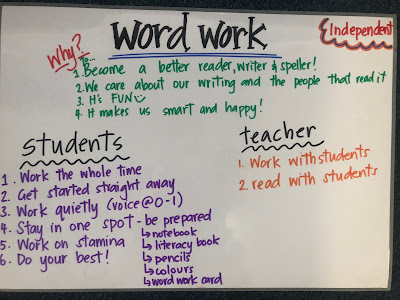Blogpost #7 - detailed inquiry (a) & (b)
Plan and conduct detailed inquiry into specific aspects of your current teaching that are relevant to the hypotheses you identified in the literature.
Prior to lockdown, implementation of Daily 5 was the new intervention for me this year. Although it may not seem like an intervention as such, I wanted to develop independent readers and writers who had the stamina to be able to read and write for longer periods of time. It took most part of Term 1 before lockdown kicked in. We maintained this the best we could through online learning and intend to do so throughout the year, and if the unlikely events of another lockdown. A huge focus for me and my teaching has been on 'Work on Writing' and 'Word work' and how to use this time effectively during our Daily 5. Time was given to unpacking what it looks like for them, the learner and me, the teacher. Here's what we came up with (and are now constantly used in our classroom)
a - Formative information about your current strengths and areas for development
Prior to lockdown, implementation of Daily 5 was the new intervention for me this year. Although it may not seem like an intervention as such, I wanted to develop independent readers and writers who had the stamina to be able to read and write for longer periods of time. It took most part of Term 1 before lockdown kicked in. We maintained this the best we could through online learning and intend to do so throughout the year, and if the unlikely events of another lockdown. A huge focus for me and my teaching has been on 'Work on Writing' and 'Word work' and how to use this time effectively during our Daily 5. Time was given to unpacking what it looks like for them, the learner and me, the teacher. Here's what we came up with (and are now constantly used in our classroom)
a - Formative information about your current strengths and areas for development
After seeking feedback on my planning, ways to integrate current programmes we have in our school and observing my practice through video, the strengths in my practice;
- Culturally responsive to my learners
- Planning (forever adapting and refining)
- Structure of lessons
- Learning intentions are visible and clear. Students know what they are learning.
- Responding to student voice about class site. Seeking feedback from them about what has helped them navigate and access learning and then making changes.
- Constantly thinking of ways for integrated learning and providing learners with authentic experiences (e.g. Samoan Language Week learning). I know that from this, my learners were engaged, writing, reading, learning and having FUN whilst doing so.
- Constantly thinking of ways for integrated learning and providing learners with authentic experiences (e.g. Samoan Language Week learning). I know that from this, my learners were engaged, writing, reading, learning and having FUN whilst doing so.
Areas for development
- pace of my lessons and the time given to students to be able to think and work.
- integration of planning (across the curriculum) just like we did for Samoan Language Week. Making this more consistent and visible in my planning and classroom.
- Meet with other CoL teachers who are working on a similar or same achievement challenge and korero about strategies that may be working well for them.
b - Baseline information that you can use at the end of the year to provide evidence of shifts in teaching
- Writing samples BOY, Pre Covid, Covid, Post Covid, Blog posts
- Student voice (through interlead, or google form)
- Student voice (through interlead, or google form)
- Student work over time
While looking into this, I know that by providing my learners with authentic learning experiences and giving them a purpose to write - that they will write because they have the ideas and support in place to do so.
While looking into this, I know that by providing my learners with authentic learning experiences and giving them a purpose to write - that they will write because they have the ideas and support in place to do so.




Comments
Post a Comment